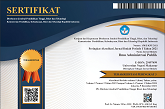The Use of Social Media in Public Services Delivery: A Case in Selected West Java Local Governments
(1) Public Administration Study Program, Faculty of Social and Political Sciences, Universitas Majalengka
(*) Corresponding Author
DOI: https://doi.org/10.26858/jiap.v11i2.24673
Abstract
Adoption of social media by government agencies is typically associated with the promotion of transparency, participation, and cooperation. However, less emphasis has been placed on the use of social media for public service delivery. As a result, this article investigates the tactics used by eight local governments in West Java Province to develop content for social media. To that end, the research re-creates a well-known interpretive framework of social media interactions in the public sector, focusing on three categories: information provision, citizen involvement, and public service delivery. The present research puts the methodology to the test by analyzing Twitter data from a key collection of local governments. The findings support the use of social media to disseminate institutional information and encourage connections with people. At the same time, local governments in West Java are beginning to employ social media to perform public services.
Keywords
Full Text:
PDFReferences
Bertot, J. C., Jaeger, P. T., and Grimes, J. M. (2010). Using ICTS to create a culture of
transparency: e-government and social media as openness and anti-corruption
tools for societies. Government Information Quarterly, 27(3), 264-271. https://doi.org/10.1016/j.giq.2010.03.001 .
Bertot, J. C., Jaeger, P.T., & Hansen, D. (2012). The impact of policies on government social media usage: Issues, challenges, and recommendations. Government Information Quarterly, 29(1), 30-40. https://doi.org/10.1016/j.giq.2011.04.004
Bonson, E., Royo, S., & Ratkai, M. (2017). Facebook practices in Western European munic- ipalities: An empirical analysis of activity and citizens’ engagement. Administration & Society, 49(3), 320–347.
Bonsón, E., Royo, S., and Ratkai, M. (2015). Citizens’ engagement on local governments’ facebook sites: an empirical analysis: the impact of different media and content types in Western Europe. Government Information Quarterly, 32, 52–62. https://doi.org/10.1016/j.giq.2014.11.001.
Cegarra, N., Córdoba, P., and Moreno, C. (2012). E-government and
citizen’s engagement with local affairs through e-websites: the case of Spanish municipalities. International Journal of Information Management, 32, 469-478. https://doi.org/10.1016/j.ijinfomgt.2012.02.008.
Chatfield, A. T., and Reddick, C. (2018). All Hands on deck to Tweet #sandy: Networked Governance of Citizen Coproduction in Turbulent Times. Government Information Quarterly 35: 259–272. https://doi.org/10.1016/j.giq.2017.09.004
Criado, J. I., Pastor, V., and Villodre, J. (2018). Measuring social media diffusion in local governments from a longitudinal perspective: adoption, barriers, and
perceptions. In Sub-National Democracy and Politics through Social Media, edited by M. H. Sobaci and I. Hatipoglu, 3–27. New York: Springer
Ellison, N., and Hardey, M. (2014). Social media and local government: citizenship,
consumption and democracy. Local Government Studies, 40(1), 21-40. https://doi.org/10.1080/03003930.2013.799066.
Jukić, T., and Merlak, M. (2017). The use of social networking sites in public
administration: the case of Slovenia. The Electronic Journal of e-Government, 15, 2–18.
Khan, G. F. (2013). The Government 2.0 Utilization Model and Implementation Scenarios. Information Development, 32(2), 135-149. https://doi.org/10.1177/2F0266666913502061 .
Medaglia, R., and L. Zheng. 2017. “Mapping Government Social Media Research and
Moving It Forward: A Framework and A Research Agenda.” Government Information Quarterly 34 (3). 496–510. doi:10.1016/j.giq.2017.06.001 .
Mergel, I. (2013). A framework for interpreting social media interactions in the public sector. Government Information Quarterly, 30, 327-334. https://doi.org/10.1016/j.giq.2013.05.015.
Nalbandian, J., O’Neil, R., Wilkes, J. M., and Kaufman, A. (2013). Contemporary challenges in local government: evolving roles and responsibilities, structures and processes. Public Administration Review, 73 (4), 567-574. https://doi.org/10.1111/puar.12059.
Picazo-Vela, S., Fernandez-Haddad, M., and Luna-Reyes, L.F. (2016). Opening the black box: developing strategies to use social media in government. Government Information Quarterly, 33(4), 693-704. https://doi.org/10.1016/j.giq.2016.08.004
Pina, V., Lourdes, T., and Royo, S. (2007). Are ICTs improving transparency and accountability in the EU regional and local governments? An empirical study. Public Administration, 85(2), 449-472. https://doi.org/10.1111/j.1467-9299.2007.00654.x.
Reddick, C. G., Chatfield, A. T., and Ojo, A. (2017). A social media text analytics
framework for double-loop learning for citizen-centric public services: a case
study of a local government Facebook use. Government Information Quarterly, 34, 110-125. https://doi.org/10.1016/j.giq.2016.11.001.
Rodríguez-Bolivar, M. P., and Alcaide, L. (2018). Political ideology and municipal size as incentives for the implementation and governance models of web 2.0 in providing public services. International Journal of Public Administration in the Digital Age, 5(1), 36–62. https://doi.org/10.4018/IJPADA.2018010103.
Sáez, A., Haro, A., and Caba, M. (2015). Using twitter for dialogic communication:
local government strategies in the european union. Local Government Studies, 41(3). 421-444. https://doi.org/10.1080/03003930.2014.991866.
Zavattaro, S. M., and Sementelli, A. J. (2014). A critical examination of social media adoption in government: introducing omnipresence. Government Information Quarterly, 31(2), 257-264. https://doi.org/10.1016/j.giq.2013.10.007.
Zavattaro, S., French, P., and Mohanty, S. (2015). A sentiment analysis of U.S.
local government tweets: the connection between tone and citizen
involvement. Government Information Quarterly, 32, 333-341. https://doi.org/10.1016/j.giq.2015.03.003.
Article Metrics
Abstract view : 874 times | PDF view : 133 timesRefbacks
- There are currently no refbacks.
Copyright (c) 2022 Amiruddin Amir Setiawan

This work is licensed under a Creative Commons Attribution 4.0 International License.
Diterbitkan oleh:
Program Studi Ilmu Administrasi Publik
Program Pascasarjana Universitas Negeri Makassar
JIAP Index By:

This work is licensed under a Creative Commons Attribution 4.0 International License.









